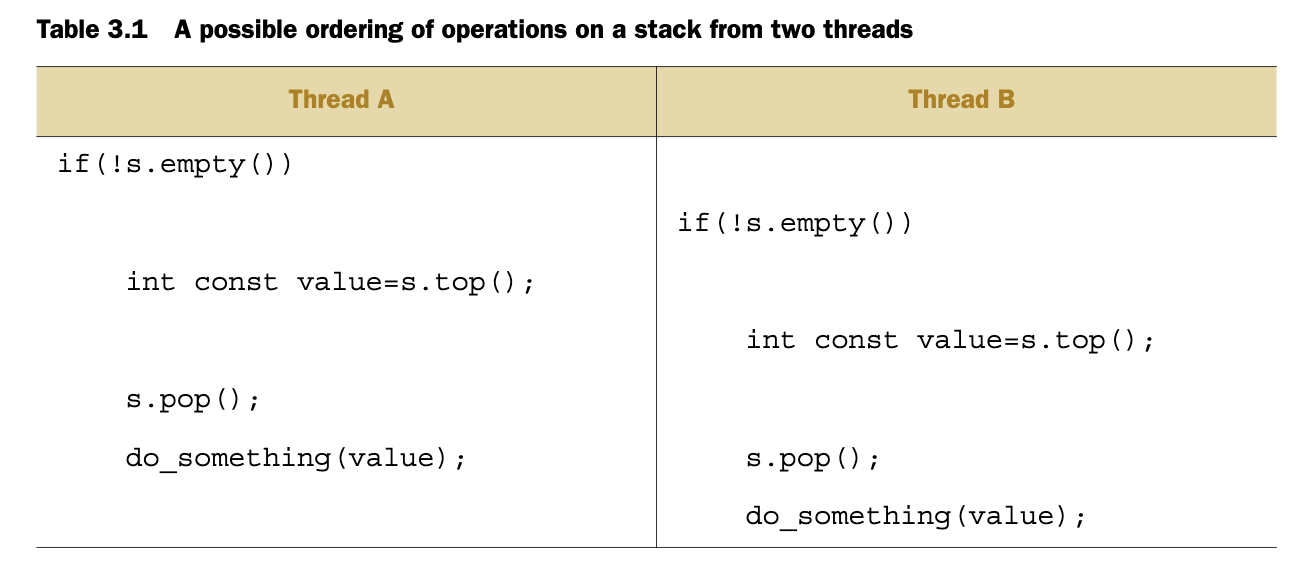mutex
summaries
1.使用RAII idiom lock method
针对mutex的lock和unlock操作,为了防止出现exception或者其他分支情况导致锁未释放,推荐使用具有RAII思想的std::lock_guard
#include <list>
#include <mutex>
#include <algorithm>
std::list<int> some_list;
std::mutex some_mutex;
void add_to_list(int new_value)
{
std::lock_guard<std::mutex> guard(some_mutex);
some_list.push_back(new_value);
}
bool list_contains(int value_to_find)
{
std::lock_guard<std::mutex> guard(some_mutex);
return std::find(some_list.begin(),some_list.end(),value_to_find)
!= some_list.end();
}
2. perfer mutex and operation functions in a class
对于protected data,mutex可以在cpp文件中当做global variable,一些针对protected data的操作需要获取mutex,但是有限推荐使用面向对象的思想将protected data,mutex lock还有对应的operations封装到一个类中,针对protected data的操作为类中的私有函数
3.对于类中被mutex保护的protected data,如果存在一个member function能返回对应数据的reference or pointer,所有的lock都是徒劳,因为这会给对应的protected data留下一个backhole,其他threads即使没有获取到lock但是通过reference or pointer都可以modify protected data,另外do not pass protected data as arguments to user-supplied functions
3. pay attention to race condition inherent in some interfaces
如下所示, stack的pop接口是通过mutex锁互斥的,但是对于用户操作接口层面会出现两个线程读取了同一个值,但是将两个元素都pop了,导致一个元素从始至终都没有被read,这可能导致非常难以发现的bug

对于这类问题,一般是通过这个接口内的操作都用mutex来进行线程间互斥,也就是粗粒度的锁(lock at large a granularity), 但是对于锁住过多的data会导致eliminate any performance benefits of concurrency,
这里我们自行实现一个stack的pop函数来解决这个问题,我们将上图的操作纳入到一个pop函数,这个函数内是mutex互斥的,
T pop()
对于这个函数可能存在一个问题,比如以下操作会先将stack的top元素先删除之后再返回,如果内部元素T是一个比较大的vector类型,再删除栈上元素之后再将vector拷贝的时候会存在可能资源不足的情况导致失败,最后导致数据丢失
T top = stack.pop()
对于这个问题解决options有
1. PASS IN A REFERENCE
2. REQUIRE A NO-THROW COPY CONSTRUCTOR OR MOVE CONSTRUCTOR
3. RETURN A POINTER TO THE POPPED ITEM
4. PROVIDE BOTH OPTION 1 AND EITHER OPTION 2 OR 3
#include <exception>
#include <memory>
#include <mutex>
#include <stack>
struct empty_stack : std::exception {
const char* what() const throw();
};
template <typename T>
class threadsafe_stack {
private:
std::stack<T> data;
mutable std::mutex m;
public:
threadsafe_stack() {}
// do the copy in the constructor body rather than the member initializer list in order to ensure that the mutex is held across the copy.
threadsafe_stack(const threadsafe_stack& other) {
std::lock_guard<std::mutex> lock(other.m);
data = other.data;
}
threadsafe_stack& operator=(const threadsafe_stack&) = delete;
void push(T new_value) {
std::lock_guard<std::mutex> lock(m);
data.push(new_value);
}
// option3, return pointer
std::shared_ptr<T> pop() {
std::lock_guard<std::mutex> lock(m);
if (data.empty()) throw empty_stack();
// store pointer for the item before popping
std::shared_ptr<T> const resmake_shared<T>(data.top());
data.pop();
return res;
}
// option1, pass in the reference
void pop(T& value) {
std::lock_guard<std::mutex> lock(m);
if (data.empty()) throw empty_stack();
value = data.top();
data.pop();
}
bool empty() const {
std::lock_guard<std::mutex> lock(m);
return data.empty();
}
};
对于fine-grained locking schemes,我们有时会不可避免的需要同事持有多个mutex,这会导致另一个问题存在dead lock